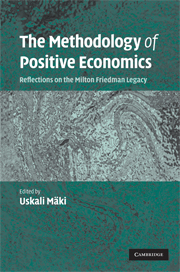Book contents
- Frontmatter
- Contents
- List of figures
- List of tables
- Contributors
- Preface
- Part 1 The classical essay in twentieth-century economic methodology
- Part 2 Reading and writing a classic
- 1 Reading the methodological essay in twentieth-century economics: map of multiple perspectives
- 2 Early drafts of Friedman's methodology essay
- 3 Unrealistic assumptions and unnecessary confusions: rereading and rewriting F53 as a realist statement
- Part 3 Models, assumptions, predictions, evidence
- Part 4 Theoretical context: firm, money, expected utility, Walras and Marshall
- Part 5 Concluding perspectives
- Index
1 - Reading the methodological essay in twentieth-century economics: map of multiple perspectives
Published online by Cambridge University Press: 02 December 2009
- Frontmatter
- Contents
- List of figures
- List of tables
- Contributors
- Preface
- Part 1 The classical essay in twentieth-century economic methodology
- Part 2 Reading and writing a classic
- 1 Reading the methodological essay in twentieth-century economics: map of multiple perspectives
- 2 Early drafts of Friedman's methodology essay
- 3 Unrealistic assumptions and unnecessary confusions: rereading and rewriting F53 as a realist statement
- Part 3 Models, assumptions, predictions, evidence
- Part 4 Theoretical context: firm, money, expected utility, Walras and Marshall
- Part 5 Concluding perspectives
- Index
Summary
Even outrageously unrealistic assumptions are just fine insofar as the theory or model involving them performs well in predicting phenomena of interest. Most economists and many non-economists will attribute this principle to Milton Friedman. Many will consider the principle itself outrageous, while others praise Friedman for having formulated it so persuasively.
Friedman's “The methodology of positive economics” was published in 1953 as the opening chapter of his Essays in Positive Economics. There is no doubt that this short essay of forty pages became the most cited, the most influential, and the most controversial piece of methodological writing in twentieth-century economics. The power and diversity of its impact and reception are evident. The essay (henceforth “F53”) has helped shape many economists' conceptions of how to do good economics and how to defend certain ways of doing economics. It has also provoked many others to voice their disagreement with the claims of the essay, to argue that the view of science suggested by F53 is deeply flawed, even dangerous for the cognitive aspirations and social responsibilities of economics. These disagreements have not diminished in the course of the years since the publication of F53. Whenever someone makes reference to “Friedman's methodological view” (perhaps using other expressions such as “Friedman's as-if methodology” or “Friedman's instrumentalism”), the context typically reveals that the expression is used either approvingly or disapprovingly, and often uncompromisingly so.
The legacy of F53 has led a double life. In the last half a century, F53 has prompted numerous scholarly commentaries and criticisms in an attempt to understand and (mostly) to resist its message. But the influence of F53 evidently reaches far beyond such explicit commentaries.
- Type
- Chapter
- Information
- The Methodology of Positive EconomicsReflections on the Milton Friedman Legacy, pp. 47 - 67Publisher: Cambridge University PressPrint publication year: 2009
- 5
- Cited by



